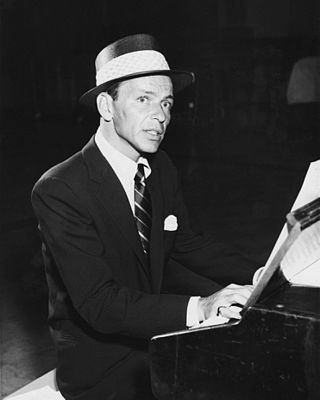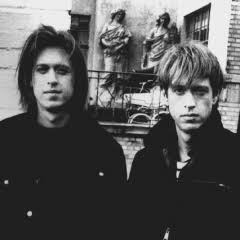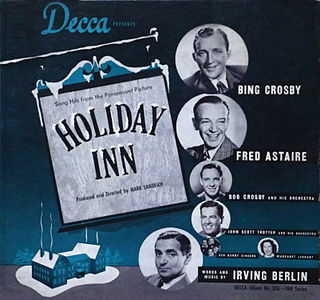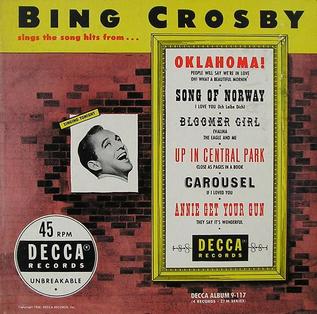
The Andrews Sisters were an American close harmony singing group of the swing and boogie-woogie eras. The group consisted of three sisters: contralto LaVerne Sophia Andrews (1911–1967), soprano Maxene Anglyn Andrews (1916–1995), and mezzo-soprano Patricia Marie Andrews (1918–2013). The sisters have sold an estimated 80 million records. Their 1941 hit "Boogie Woogie Bugle Boy" can be considered an early example of jump blues. Other songs closely associated with the Andrews Sisters include their first major hit, "Bei Mir Bist Du Schön " (1937), "Beer Barrel Polka " (1939), "Beat Me Daddy, Eight to the Bar" (1940), "Don't Sit Under the Apple Tree " (1942), and "Rum and Coca-Cola" (1945), which helped introduce American audiences to calypso.

America, I Hear You Singing is an album recorded and released in 1964 by American singers Frank Sinatra and Bing Crosby, backed by Fred Waring's Pennsylvanians. The album is a collection of patriotic songs, recorded as a tribute to the assassinated president John F. Kennedy. The artists would collaborate again for the album 12 Songs of Christmas, released later the same year.
Shine is a popular song with lyrics by Cecil Mack and Tin Pan Alley songwriter Lew Brown and music by Ford Dabney. It was published in 1910 by the Gotham-Attucks Music Publishing Company and used by Aida Overton Walker in His Honor the Barber, an African-American road show. According to Perry Bradford, himself a songster and publisher, the song was written about an actual man named Shine who was with George Walker when they were badly beaten during the New York City race riot of 1900.
"It's Been a Long, Long Time" is a big band-era song that was a hit at the end of World War II, with music by Jule Styne and lyrics by Sammy Cahn.

Bing with a Beat was Bing Crosby's seventh long play album but his first with RCA Victor. It was recorded at the Radio Recorders "Annex" Studio in Los Angeles and released on vinyl in September 1957. Bing with a Beat is a 1957 concept album where the songs feature "hot" jazz and dixieland arrangements by Matty Matlock, played by Bob Scobey's Frisco Jazz Band.

Frank Sinatra's musical career began in the swing era in 1935, and ended in 1995, although he did briefly retire in 1971, before returning to music in 1973. Sinatra is one of the most influential music artists of the 20th century, and has sold 150 million records worldwide, making him one of the best-selling music artists of all-time. Rock critic Robert Christgau called Sinatra "the greatest singer of the 20th century". In addition to his music career, Sinatra was also a successful film actor, having won the Academy Award for Best Supporting Actor for his role as Private Angelo Maggio in From Here to Eternity (1953).

A Couple of Song and Dance Men is a 1975 vinyl album made by Fred Astaire and Bing Crosby for United Artists. It was recorded with Pete Moore and his Orchestra, and the Johnny Evans Singers in July 1975 at the Music Centre, Wembley.

The Williams Brothers featuring Andy Williams were a singing quartet formed in the mid 1930s. They initially entertained on radio stations and later appeared in four musical films in the 1940s. After recording with Bing Crosby led to a nightclub act backing Kay Thompson, they broke up in the early 1950s and went their separate ways. The second generation of Williams Brothers, twins Andrew and David began as teen idols and a musical duo in the 1970s performing extensively on radio, television and in movies and nightclubs.

Welcome Stranger is a 1947 film directed by Elliott Nugent and starring Bing Crosby, Barry Fitzgerald, and Joan Caulfield. It was filmed in Hollywood with location shots at Munz Lakes during March to May 1946. Elliott Nugent appeared in one scene as a doctor sent to examine Barry Fitzgerald and that scene was directed by Billy Wilder.

Song Hits from Holiday Inn is a studio album of phonograph records by Bing Crosby and Fred Astaire released in July 1942 featuring songs presented in the American musical film Holiday Inn. These are the longer studio recorded versions of the songs presented in the film. For the songs that were actually in the film, see Holiday Inn (soundtrack). This album is not only notable because it is one of the greatest works of the highly regarded songwriter Irving Berlin, but it is only Crosby's third studio album. This was also the first release of Crosby's signature song "White Christmas" on shellac disc record. The 1942 version would be released only one more time, in 1945's compilation album, Merry Christmas, before the song was re-recorded in 1947. The later version became the standard.
This is a list of Bing Crosby songs he recorded twice or more during his career, excluding all of the 1954 re-recordings for Bing: A Musical Autobiography.

Blue Skies is a studio album of phonograph records by Bing Crosby and Fred Astaire released in 1946 featuring songs that were presented in the American musical film Blue Skies. Like Song Hits from Holiday Inn, the entire 78 rpm album would be composed of Irving Berlin songs written specifically for the film. This was the first release of one of Astaire's greatest songs, "Puttin' On the Ritz", on shellac disc record.

St. Patrick's Day is a compilation album of phonograph records by Bing Crosby released in 1947 featuring songs with an Irish theme. This includes one of Crosby's most-beloved songs, "Too-Ra-Loo-Ra-Loo-Ral" which was number four on the Billboard Hot 100 for 12 weeks, and topped the Australian charts for an entire month, on shellac disc record. This version, the 1945 re-recording, was released earlier in another Crosby album, Selections from Going My Way.

Favorite Hawaiian Songs, Volume One is a compilation album of phonograph records by Bing Crosby released in 1946 featuring songs that were sung in a Hawaiian-type genre. This was the fourth Hawaiian-themed album release for Crosby.

Favorite Hawaiian Songs, Volume Two is a compilation album of phonograph records by Bing Crosby released in 1946 featuring songs that were sung in a Hawaiian-type genre. This was the fifth Hawaiian-themed album release for Crosby.

Bing Crosby Sings with Al Jolson, Bob Hope, Dick Haymes and the Andrews Sisters is a Bing Crosby Decca Records studio 78rpm album of phonograph records featuring Crosby with several of Decca's top artists.

Bing Crosby Sings the Song Hits from Broadway Shows is a Decca Records compilation 78rpm album of phonograph records by Bing Crosby featuring some of the hits from Broadway musicals.

Bing Crosby Sings Cole Porter Songs is a Decca Records studio 78rpm album of phonograph records by Bing Crosby featuring the songs of Cole Porter.

Way Back Home is a Decca Records compilation 78rpm album of phonograph records by Bing Crosby featuring sentimental and homely songs.

'Bing and the Dixieland Bands is a Decca Records album by Bing Crosby featuring songs with a Dixieland flavour which was issued as a 10” LP with catalog No. DL5323 and as a 4-disc 78rpm box set (A-852) and as a 4-disc 45rpm set (9–232).

















